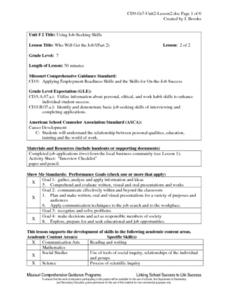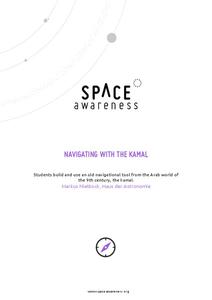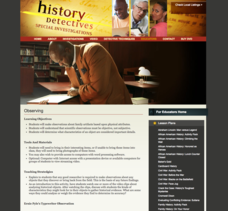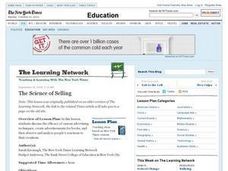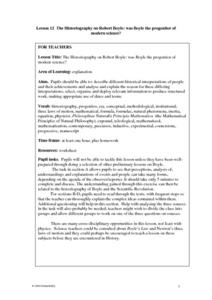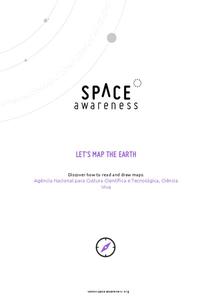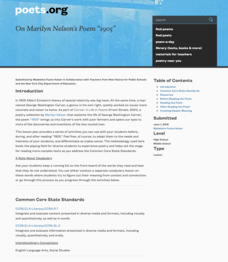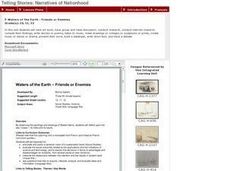University of Minnesota
Mirroring Emotions
Do you ever give your class the "teacher look"? Without saying a word, they become silent and engaged (hopefully). How do they know what you're thinking? Explore the concept of nonverbal communication and how it relates to our...
Curated OER
Science Fair With An Energy Efficiency Flair
In order to learn more about energy conservation, pupils work to promote energy efficiency by participating in a school-wide science fair with an emphasis on energy conservation. In addition to displaying their projects, learners invite...
Curated OER
Transparent Shoebox Dig
Take this simulated archaeological dig one layer at a time with your young pupils to encourage observation, critical thinking, and careful attention. Using a transparent box full of layers of sand and artifacts, pupils examine the...
Curated OER
Who Will Get the Job?
Seventh graders demonstrate their ability to identify interview skills that lead to success in the job-seeking process by participating in and observing an interview with an employer. Students also use a checklist to validate their...
Space Awareness
Navigating with the Kamal
Historians have proven that as early as 1497 skilled navigators were using a kamal to sail across oceans. Scholars learn about navigation tools and astronomy before building their own kamals. They then learn how to use it to determine...
PBS
Observation
Students study making scientific observations . They conduct a "field study" in their attic and make observations about their family artifacts based upon physical attributes. In addition, they determine what characteristics of an object...
Curated OER
Observing the Sky
Students explore astronomy. In this astronomy lesson, students discuss the history of the movement of celestial bodies and then communicate with other students regarding the movements that they observe in the sky nightly. Students...
Curated OER
The Science of Selling
Students discuss advertisements and techniques they have discovered. They read an article about the science of selling and create an advertisement of their own to sell a book. They record people's reactions to their advertisement and...
Constitutional Rights Foundation
Refugees from the Caribbean: Cuban and Haitian “Boat People”
Should refugees fleeing poverty be allowed the same entrance into the United States as those fleeing persecution? High schoolers read about US foreign policy in the late 20th century regarding refugees from Cuba and Haiti, and engage in...
Association of American Geographers
Project GeoSTART
Investigate the fascinating, yet terrifying phenomenon of hurricanes from the safety of your classroom using this earth science unit. Focusing on developing young scientists' spacial thinking skills, these lessons engage...
Space Awareness
Navigation in the Ancient Mediterranean and Beyond
Ancient texts, like Homer's Odyssey, mentions navigating ships by observing constellations. Pupils learn about the link between history and astronomy as they relate to navigation in the Bronze Age. Scholars complete two hands-on...
Benjamin Franklin Tercentenary
Science Pen Pals
Students explore the scientific career of Benjamin Franklin. In this science lesson, students discuss Franklin's correspondence with other scientists and write letters describing Benjamin Franklin's experiments.
Curated OER
The Historiography on Robert Boyle: Was Boyle the Progenitor of Modern Science?
Students participate in a warm-up activity by attending a football match writing an account of who won the game. They discuss how their account could differ from someone else's account of the game. They discuss how different people's...
Curated OER
People Change the Landscape
Students examine ways in which humans have brought change to the natural environment. In this ecology and literacy lesson, students listen to the book Island Boy by Barbara Cooney. Students observe and define map-reading vocabulary as...
Curated OER
Observing Sea Ice
Students study and observe types of sea ice found in Alaska. In this sea ice lesson, students use the student network for observing weather to study the different types of sea ice. Students study sea ice depicted in Alaskan art.
Captain Planet Foundation
George Washington Carver and the Sweet Potato
Learn about George Washington Carver's important contributions to agriculture by studying the sweet potato. First graders read about the inventor's observations and prepare sweet potato slips for the class garden. Additionally, they...
Curated OER
Autism and Autism Spectrum Disorders: Disorders Extending Beyond the "Norm"
Learners develop an understanding of autism by engaging in an inquiry-based discussion. Pupils are exposed to the vast array of defining characteristics of autism spectrum disorders. They create posters about the developmental...
Peace Corps
Brief Encounters
How are Pandyas different than Chispas? Explore cultural norms and societal behaviors with an engaging role-play activity. Split into groups of two hypothetical cultural groups, the formal Pandyas and the sociable Chispas, and another...
Curated OER
Layer Cake Archaeology
Excavating cake? Why not! Kids spoon into some layers and artifacts during this tasty hands-on activity. The cake, a simulated archaeological dig, is the object of observation and discussion.
Space Awareness
Let's Map the Earth
Before maps went mobile, people actually had to learn how to read maps. Pupils look at map elements in order to understand how to read them and locate specific locations. Finally, young cartographers discover how to make aerial maps.
Curated OER
Observation
Students practice observation skills by discussing physical attributes of family artifacts. They determine what characteristics of an object are considered important details.
Academy of American Poets
On Marilyn Nelson's Poem “1905”
Marilyn Nelson's poem, "1905," asks young scholars to compare and contrast George Washington Carver and Albert Einstein. After studying images of the two scientists and listing their observations, class members listen to several readings...
Middle Tennessee State University
The Invention of the Telephone
All of the people in your class would agree that life would be different without the invention of the telephone! Study Alexander Graham Bell's most famous and influential invention through the primary source document of his...
Curated OER
Waters of the Earth - Friends or Enemies
High Schoolers observe the paintings and drawings of Robert Harris, and do a study of the ocean that delves into human and physical geography. Learners make prints, listen to music, create a database, and perform research on a specific...



